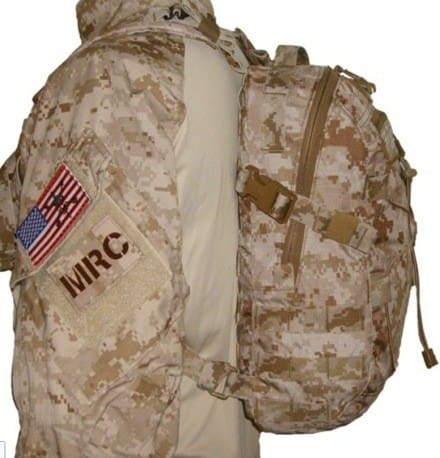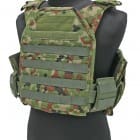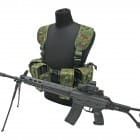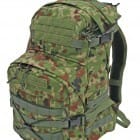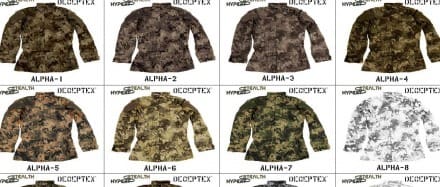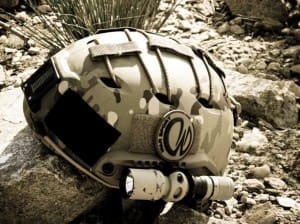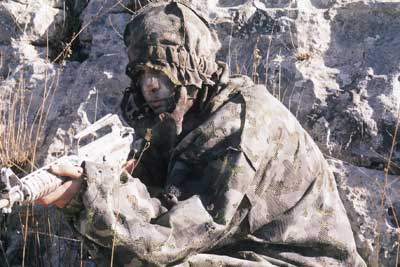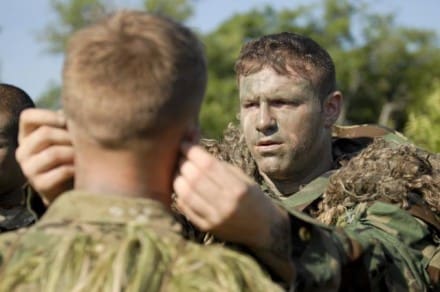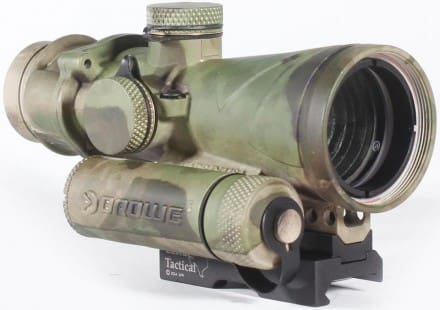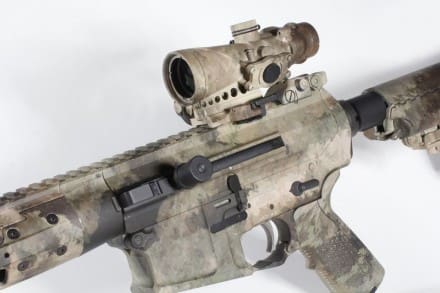Archive for the ‘Camo’ Category
Desert Digital Rolling Off the Line at Mayflower
Thursday, May 17th, 2012TT Exclusive for Aggressor Group
Wednesday, May 16th, 2012These products are made in JGSDF flecktarn camo by Tactical Tailor exclusively for Aggressor Group. They’re pretty cool and we though you might get a kick out of them.
Deceptex Up to 164 Patterns
Friday, May 11th, 2012Hyperstealth Biotechnology Corporation’s print on demand camouflage service, Deceptex, is up to 164 available patterns.
We spoke with Hyperstealth at Warrior Expo West and Guy Cramer said that uniforms would be available in a field uniforms cut similar to the ACU as well as an Underway uniform cut.
Available this Summer from www.hyperstealth.com/deceptex.
Army Cancels Improvised Camo RFI
Friday, May 11th, 2012By close of business yesterday, the Army had cancelled the Request For Information from industry for “Request for Information on Field Solutions to Soldier Camouflage: Identify in-the-field solutions/materials that will give Soldiers the ability to improve/adjust camouflage uniforms and equipment to better match the specific terrain.” It’s too bad. This could have been pretty cool.
Caveat Emptor – War Bungee
Thursday, May 10th, 2012
As always, make sure you know who you are buying from. If the item is surprisingly inexpensive, it’s probably not legit. All parts, pieces and labor involved in the Suppressor Sock and War Bungee from War Sport are made in the USA. Ensure you purchase them from War Sport directly or from an authorized dealer.
-DR
US Army Interested in Field Solutions to Soldier Camouflage
Thursday, May 10th, 2012In a Request for Information released last week entitled, “Request for Information on Field Solutions to Soldier Camouflage: Identify in-the-field solutions/materials that will give Soldiers the ability to improve/adjust camouflage uniforms and equipment to better match the specific terrain” the US Army has cast a net seeking “for on-the-spot/field solutions that can be applied to the baseline uniform that will provide for better visual/near-infrared blending for specific areas. These solutions will have the capability to adjust camouflage uniforms and Personnel Protective Equipment (PPE) in-the-field to provide enhanced performance in specific sites of conflict.”
During the Q&A portion of the US Army Camouflage Improvement Effort industry day, PEO Soldier officials specifically ruled out such nontraditional solutions for the program which concentrates on a family of printed camouflage patterns for clothing and individual equipment. Apparently, they’ve realized that even three patterns (Temperate, Woodland and Desert) won’t even be specific enough for every environment and that there will be a requirement for even more specific patterns. Considering how long it has taken to make this camo program happen, I don’t blame them. A conflict could well be over before a development program could even begin let alone see its way to completion.
There’s another interesting aspect to this RFI. If a solution is identified, it could allow the Army to retain a single pattern and just rely on the site specific camo technology for anything that doesn’t match well.
Having said all of that I have to mention that I’m not sure what happened, but the Army I was in, way back in the 80s taught Soldiers to utilize natural materials from their local environment to further camouflage themselves. This really might be more of a ‘Training’ issue than a ‘Material’ one (DOTMLPF). I’ve noticed a lot of field craft has gone by the wayside. I don’t know if the Army has forgotten lessons learned, leaders aren’t enforcing standards or the Army is just plain tired after 10 years at war.
At any rate, if you’ve got some great ideas, then check out the RFI and let the Army know about it.
Browe Optics in A-TACS FG
Thursday, May 10th, 2012BROWE Inc now offers their 4 x 32 BCO in A-TACS FG (the Foliage/Green version). Nice whether you need it to keep from being seen or you just want to sport the finest in Gucci weapon furniture. Here’s the same optic on an LWRC in regular A-TACS.
The BROWE BCO optics have earned an excellent reputation in just a short time, for a number of reasons (including one model with a blue reticle that will seems to improve the performance of individuals with vision issues, like color blindness).
Browe Inc – www.facebook.com/BROWE.Inc or www.browe-inc.com
Hyperstealth Featured in UK Wired
Tuesday, May 8th, 2012Hyperstealth Biotechnology Corporation has been featured in the UK edition of June’s Wired magazine.


